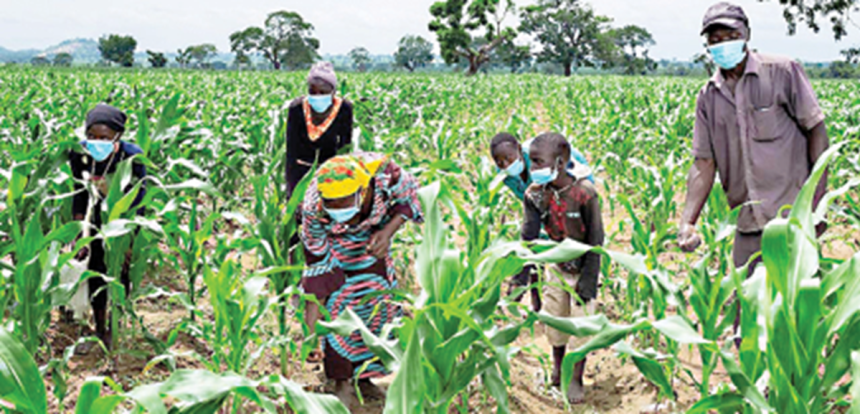THE National Security Adviser (NSA) Mallam Nuhu Ribadu, has revealed that no fewer than 150 million Nigerians, including farmers have been affected by insecurity across the country.
Ribadu made this statement in Abuja after signing a Memorandum of Understanding (MoU) between the National Counter Terrorism Centre (NCTC) and the International Institute of Tropical Agriculture (IITA).
Ribadu, as reported by AgroNigeria.com stressed that although Nigerians are predominantly farmers, insecurity has severely disrupted their livelihoods, leaving many struggling with hunger and hardship.
He called for a whole-of-society approach to address the root causes of insecurity.
“Security is the biggest challenge we are facing across all sectors, but agriculture is the most vulnerable to insecurity. As a nation of predominantly farmers, insecurity directly impacts our livelihoods. Whether you are a farmer or from a farming family, we have all been affected in one way or another. Insecurity has turned our lives upside down. By coming together, we can better address this issue. We must unite to restore security and normalcy to our people’s lives,” Ribadu said.
He warned that Nigeria’s population size amplifies the severity of the situation. “Our people desperately need relief. I don’t think there is any country in the world today facing the same magnitude of challenges we are. Given our large population, the number of people affected by insecurity in Nigeria could exceed 120 to 150 million,” he stated.
Ribadu also noted that the perpetrators of insecurity were determined to destabilize the country, but the government is equally determined to stop them. He cited the instability seen in neighboring countries such as Sudan, Chad, Niger, Burkina Faso, and Mali but praised Nigeria’s security forces for maintaining resilience.
“The malicious elements are becoming more aggressive, having already destabilized democracies in neighboring countries. However, thanks to our security forces, we remain resilient in the Sahel region. We are facing difficulties, but we are managing to survive,” he said.
Highlighting the significance of the newly signed MoU, Ribadu described the partnership between NCTC and IITA as a pivotal moment in Nigeria’s journey toward sustainable peace and security.
“For too long, our approach to countering terrorism has relied predominantly on kinetic responses. While essential, we’ve come to realize that lasting peace requires more than force alone.
“Addressing the root causes of violent extremism such as poverty, lack of opportunity, and social disenfranchisement – is equally crucial. This understanding underpins our whole-of-government and whole-of-society approach,” he explained.
The collaboration will focus on the Agribusiness and Livelihood Empowerment Project for the disarmament, demobilization, deradicalization, rehabilitation, and reintegration of terrorists and communities affected by violent extremism.
Ribadu said the project represented the government’s commitment to non-kinetic approaches that empower individuals, restore livelihoods, and promote social cohesion.
According to Ribadu, Nigeria has made progress with its deradicalization and reintegration programmes, particularly through Operation SAFE CORRIDOR in Mallam Sidi, Gombe State.
“We are also witnessing a growing willingness among terrorists, bandits, and kidnappers in the North West regions to surrender,” he added.
National Coordinator of NCTC, Maj.-Gen. Adamu Laka, reinforced the need to address the root causes of violent extremism, such as poverty, marginalization, and lack of opportunity.
He said the Federal Government’s Disarmament, Deradicalization, and Reintegration (DDR) programme in Gombe State has already recorded significant gains, with many low-risk former combatants successfully rehabilitated and reintegrated.
ALSO READ FROM NIGERIAN TRIBUNE: WhatsApp stops working on iPhone 6, 12 other phone models from June 2025
“It is in this context that we consider agriculture as a critical tool for driving economic empowerment, restoring livelihoods, and promoting social cohesion in conflict-affected communities,” Laka said.
He noted that the MoU marked a key milestone in the shared efforts to build resilience and reduce the drivers of violent extremism through livelihood empowerment.
The agreement will serve as a strategic framework guiding the implementation of the Agribusiness and Livelihood Project, targeting ex-combatants, conflict-affected communities, and widows of fallen soldiers.
“Through this project, beneficiaries will gain access to land, inputs, training, mentorship, and market linkages supported by collaboration with state and local governments, civil society, and the private sector,” he added.
Deputy Director-General of IITA, Dr. Denshell Kenton, stated that the principles guiding the project are not new but have been tested and proven effective.
He emphasised that the focus is on long-term, sustainable, positive change.
“These are not quick fixes. The focus is on long-term, sustainable, positive changes that lead to communities becoming much better places to live. Because each person and family, one, have enough good quality food, and two, respectable incomes and living conditions that lead to the overall community being stable and prosperous. And when we have many communities, or all communities, in an area that are improved, then we have success,” Kenton said.
He pledged IITA’s full commitment to the partnership.
“I pledge to you that IITA is ready, willing, and able to be your partner in Zamfara, Gombe states, and any other states that decide to join this dynamic partnership that we’re having with NCTC. We don’t claim to have all the answers, but I promise you we will work day and night with commitment and motivation in partnership with you to make communities where we are working together safe, stable, and productive communities,” he concluded.






